Semester 2, 2017 HLSC122: Stimulant Use in College Students Evaluation
VerifiedAdded on 2020/04/29
|8
|1987
|263
Report
AI Summary
This report critically evaluates the use of stimulants among college students, focusing on the non-medical use of drugs like those prescribed for ADHD. It analyzes six articles to address the PICO question: Do stimulants increase academic performance in university students? The report examines the research aims, designs, findings, and limitations of each study, highlighting the context of stimulant use, the relationship between non-medical stimulant use, executive functioning, and academic outcomes. It also explores the barriers to applying research evidence in healthcare, such as the complexity of research and organizational resistance. The conclusion synthesizes the findings, emphasizing that while stimulants may offer some self-motivation, there is no strong evidence supporting their role in enhancing cognitive function or academic performance in the long term, while also pointing to the risks associated with their use.
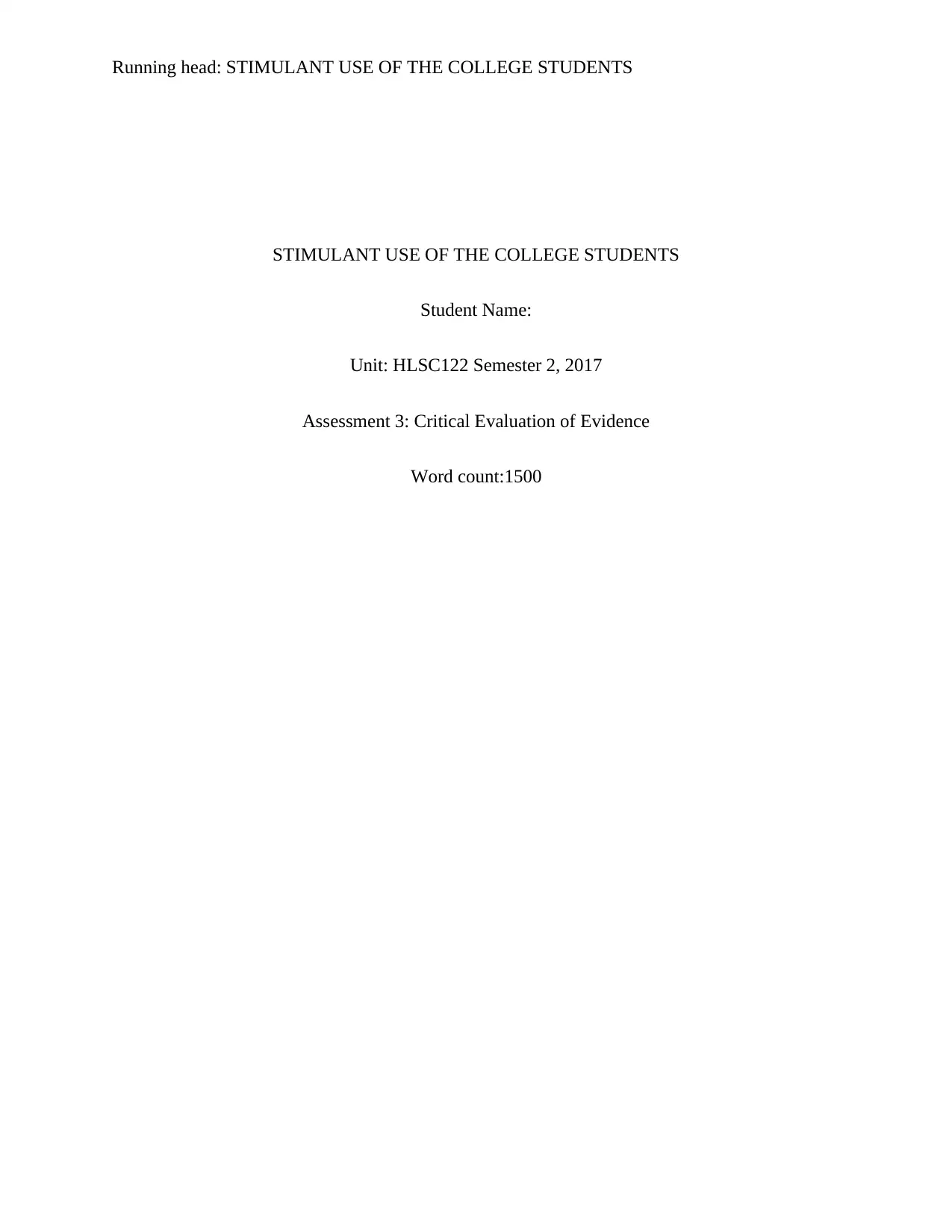
Running head: STIMULANT USE OF THE COLLEGE STUDENTS
STIMULANT USE OF THE COLLEGE STUDENTS
Student Name:
Unit: HLSC122 Semester 2, 2017
Assessment 3: Critical Evaluation of Evidence
Word count:1500
STIMULANT USE OF THE COLLEGE STUDENTS
Student Name:
Unit: HLSC122 Semester 2, 2017
Assessment 3: Critical Evaluation of Evidence
Word count:1500
Paraphrase This Document
Need a fresh take? Get an instant paraphrase of this document with our AI Paraphraser
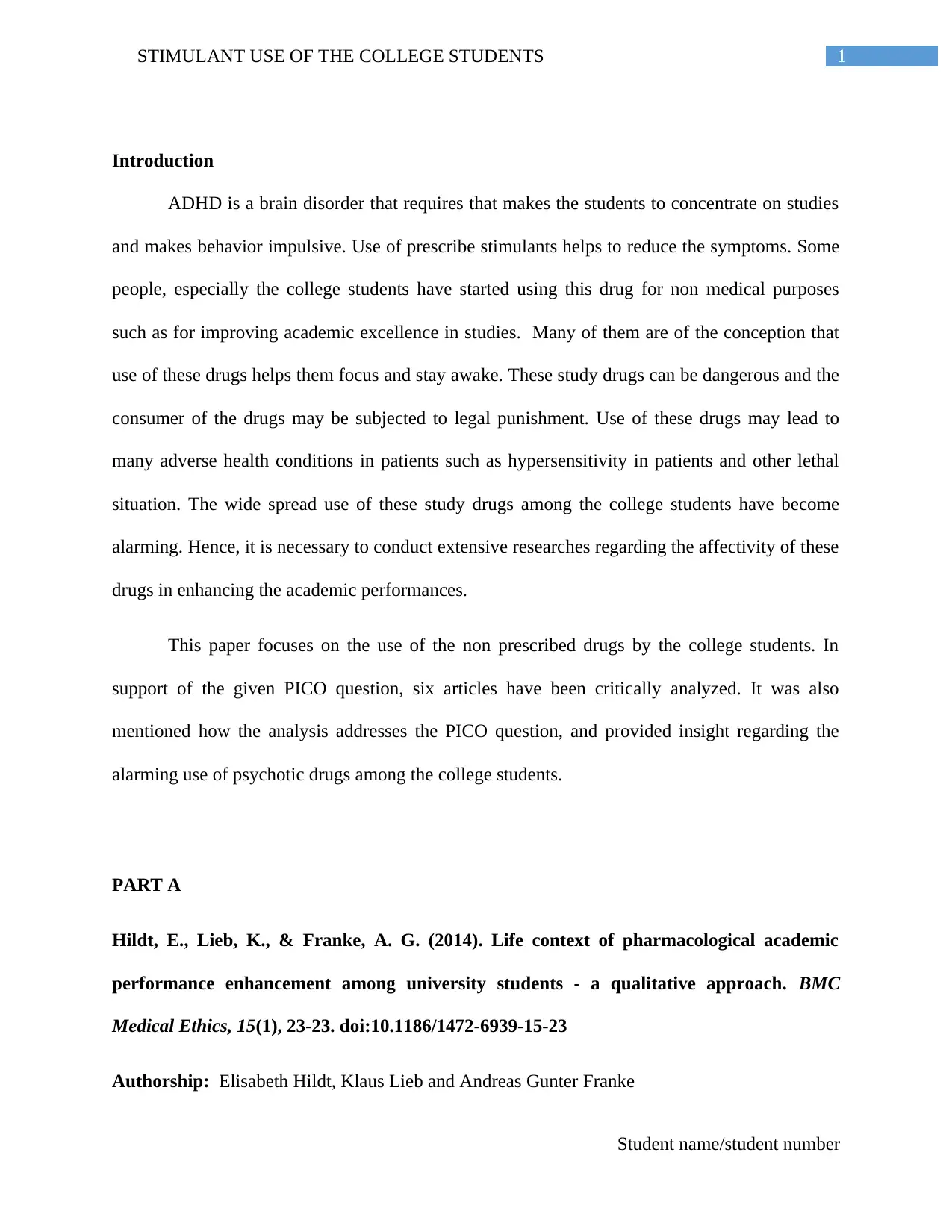
1STIMULANT USE OF THE COLLEGE STUDENTS
Introduction
ADHD is a brain disorder that requires that makes the students to concentrate on studies
and makes behavior impulsive. Use of prescribe stimulants helps to reduce the symptoms. Some
people, especially the college students have started using this drug for non medical purposes
such as for improving academic excellence in studies. Many of them are of the conception that
use of these drugs helps them focus and stay awake. These study drugs can be dangerous and the
consumer of the drugs may be subjected to legal punishment. Use of these drugs may lead to
many adverse health conditions in patients such as hypersensitivity in patients and other lethal
situation. The wide spread use of these study drugs among the college students have become
alarming. Hence, it is necessary to conduct extensive researches regarding the affectivity of these
drugs in enhancing the academic performances.
This paper focuses on the use of the non prescribed drugs by the college students. In
support of the given PICO question, six articles have been critically analyzed. It was also
mentioned how the analysis addresses the PICO question, and provided insight regarding the
alarming use of psychotic drugs among the college students.
PART A
Hildt, E., Lieb, K., & Franke, A. G. (2014). Life context of pharmacological academic
performance enhancement among university students - a qualitative approach. BMC
Medical Ethics, 15(1), 23-23. doi:10.1186/1472-6939-15-23
Authorship: Elisabeth Hildt, Klaus Lieb and Andreas Gunter Franke
Student name/student number
Introduction
ADHD is a brain disorder that requires that makes the students to concentrate on studies
and makes behavior impulsive. Use of prescribe stimulants helps to reduce the symptoms. Some
people, especially the college students have started using this drug for non medical purposes
such as for improving academic excellence in studies. Many of them are of the conception that
use of these drugs helps them focus and stay awake. These study drugs can be dangerous and the
consumer of the drugs may be subjected to legal punishment. Use of these drugs may lead to
many adverse health conditions in patients such as hypersensitivity in patients and other lethal
situation. The wide spread use of these study drugs among the college students have become
alarming. Hence, it is necessary to conduct extensive researches regarding the affectivity of these
drugs in enhancing the academic performances.
This paper focuses on the use of the non prescribed drugs by the college students. In
support of the given PICO question, six articles have been critically analyzed. It was also
mentioned how the analysis addresses the PICO question, and provided insight regarding the
alarming use of psychotic drugs among the college students.
PART A
Hildt, E., Lieb, K., & Franke, A. G. (2014). Life context of pharmacological academic
performance enhancement among university students - a qualitative approach. BMC
Medical Ethics, 15(1), 23-23. doi:10.1186/1472-6939-15-23
Authorship: Elisabeth Hildt, Klaus Lieb and Andreas Gunter Franke
Student name/student number
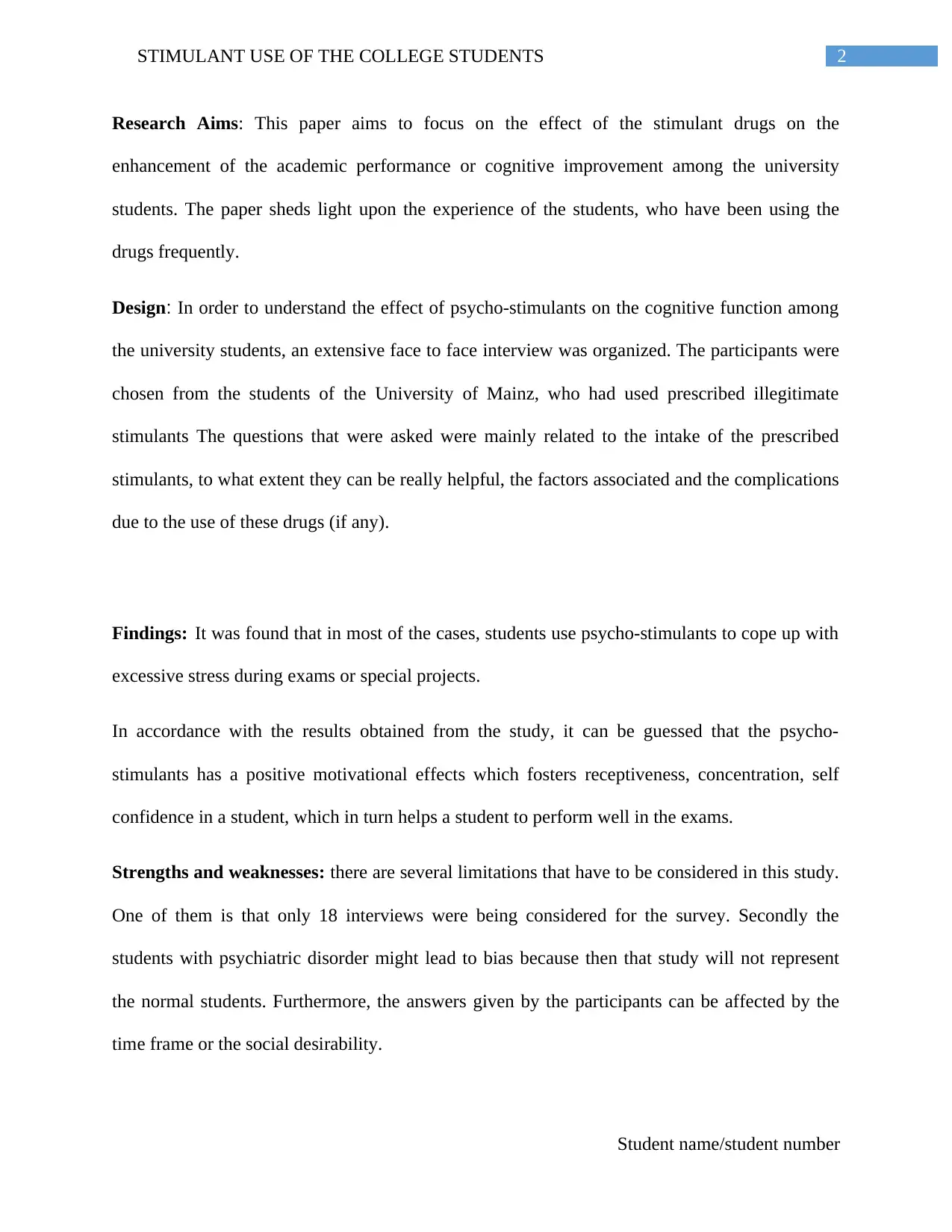
2STIMULANT USE OF THE COLLEGE STUDENTS
Research Aims: This paper aims to focus on the effect of the stimulant drugs on the
enhancement of the academic performance or cognitive improvement among the university
students. The paper sheds light upon the experience of the students, who have been using the
drugs frequently.
Design: In order to understand the effect of psycho-stimulants on the cognitive function among
the university students, an extensive face to face interview was organized. The participants were
chosen from the students of the University of Mainz, who had used prescribed illegitimate
stimulants The questions that were asked were mainly related to the intake of the prescribed
stimulants, to what extent they can be really helpful, the factors associated and the complications
due to the use of these drugs (if any).
Findings: It was found that in most of the cases, students use psycho-stimulants to cope up with
excessive stress during exams or special projects.
In accordance with the results obtained from the study, it can be guessed that the psycho-
stimulants has a positive motivational effects which fosters receptiveness, concentration, self
confidence in a student, which in turn helps a student to perform well in the exams.
Strengths and weaknesses: there are several limitations that have to be considered in this study.
One of them is that only 18 interviews were being considered for the survey. Secondly the
students with psychiatric disorder might lead to bias because then that study will not represent
the normal students. Furthermore, the answers given by the participants can be affected by the
time frame or the social desirability.
Student name/student number
Research Aims: This paper aims to focus on the effect of the stimulant drugs on the
enhancement of the academic performance or cognitive improvement among the university
students. The paper sheds light upon the experience of the students, who have been using the
drugs frequently.
Design: In order to understand the effect of psycho-stimulants on the cognitive function among
the university students, an extensive face to face interview was organized. The participants were
chosen from the students of the University of Mainz, who had used prescribed illegitimate
stimulants The questions that were asked were mainly related to the intake of the prescribed
stimulants, to what extent they can be really helpful, the factors associated and the complications
due to the use of these drugs (if any).
Findings: It was found that in most of the cases, students use psycho-stimulants to cope up with
excessive stress during exams or special projects.
In accordance with the results obtained from the study, it can be guessed that the psycho-
stimulants has a positive motivational effects which fosters receptiveness, concentration, self
confidence in a student, which in turn helps a student to perform well in the exams.
Strengths and weaknesses: there are several limitations that have to be considered in this study.
One of them is that only 18 interviews were being considered for the survey. Secondly the
students with psychiatric disorder might lead to bias because then that study will not represent
the normal students. Furthermore, the answers given by the participants can be affected by the
time frame or the social desirability.
Student name/student number
⊘ This is a preview!⊘
Do you want full access?
Subscribe today to unlock all pages.

Trusted by 1+ million students worldwide
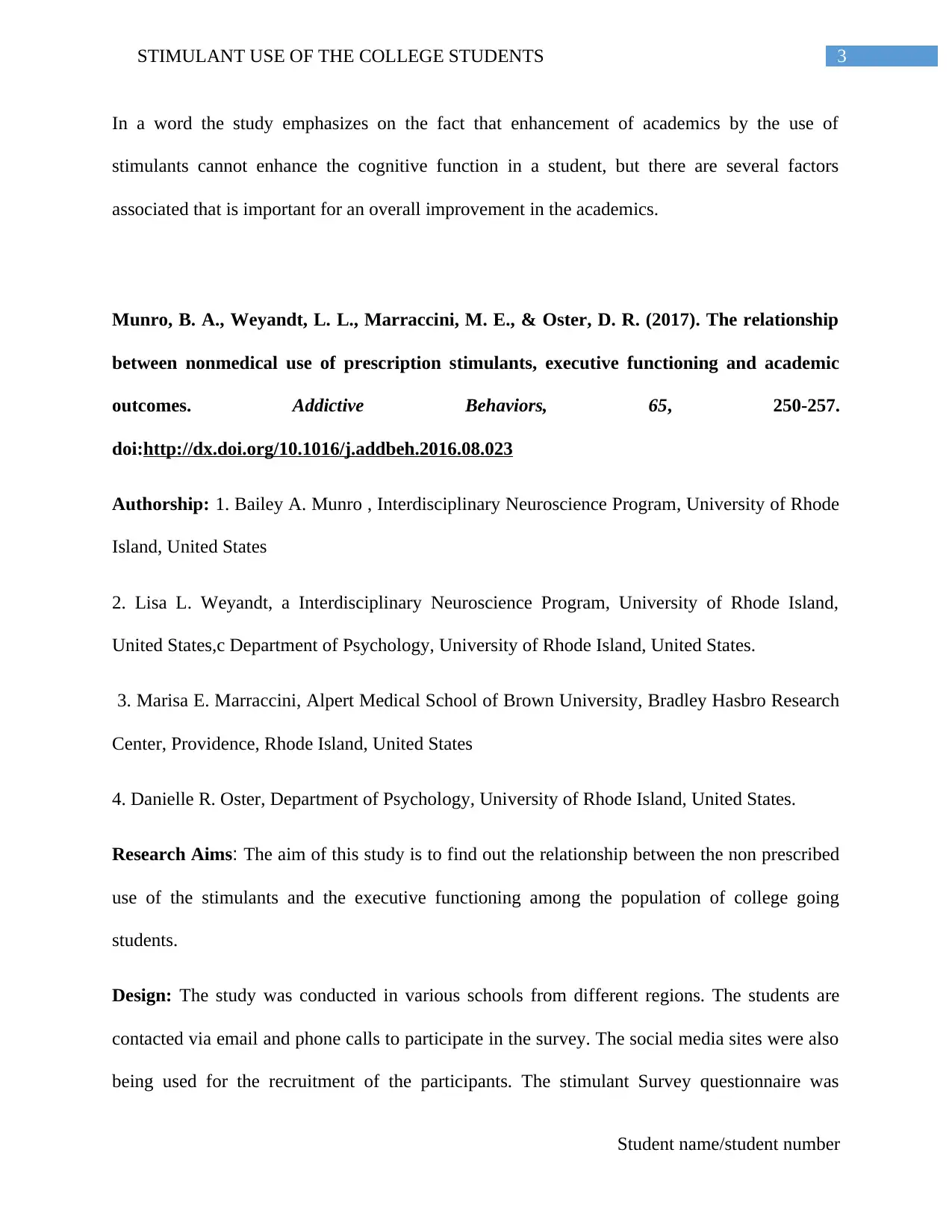
3STIMULANT USE OF THE COLLEGE STUDENTS
In a word the study emphasizes on the fact that enhancement of academics by the use of
stimulants cannot enhance the cognitive function in a student, but there are several factors
associated that is important for an overall improvement in the academics.
Munro, B. A., Weyandt, L. L., Marraccini, M. E., & Oster, D. R. (2017). The relationship
between nonmedical use of prescription stimulants, executive functioning and academic
outcomes. Addictive Behaviors, 65, 250-257.
doi:http://dx.doi.org/10.1016/j.addbeh.2016.08.023
Authorship: 1. Bailey A. Munro , Interdisciplinary Neuroscience Program, University of Rhode
Island, United States
2. Lisa L. Weyandt, a Interdisciplinary Neuroscience Program, University of Rhode Island,
United States,c Department of Psychology, University of Rhode Island, United States.
3. Marisa E. Marraccini, Alpert Medical School of Brown University, Bradley Hasbro Research
Center, Providence, Rhode Island, United States
4. Danielle R. Oster, Department of Psychology, University of Rhode Island, United States.
Research Aims: The aim of this study is to find out the relationship between the non prescribed
use of the stimulants and the executive functioning among the population of college going
students.
Design: The study was conducted in various schools from different regions. The students are
contacted via email and phone calls to participate in the survey. The social media sites were also
being used for the recruitment of the participants. The stimulant Survey questionnaire was
Student name/student number
In a word the study emphasizes on the fact that enhancement of academics by the use of
stimulants cannot enhance the cognitive function in a student, but there are several factors
associated that is important for an overall improvement in the academics.
Munro, B. A., Weyandt, L. L., Marraccini, M. E., & Oster, D. R. (2017). The relationship
between nonmedical use of prescription stimulants, executive functioning and academic
outcomes. Addictive Behaviors, 65, 250-257.
doi:http://dx.doi.org/10.1016/j.addbeh.2016.08.023
Authorship: 1. Bailey A. Munro , Interdisciplinary Neuroscience Program, University of Rhode
Island, United States
2. Lisa L. Weyandt, a Interdisciplinary Neuroscience Program, University of Rhode Island,
United States,c Department of Psychology, University of Rhode Island, United States.
3. Marisa E. Marraccini, Alpert Medical School of Brown University, Bradley Hasbro Research
Center, Providence, Rhode Island, United States
4. Danielle R. Oster, Department of Psychology, University of Rhode Island, United States.
Research Aims: The aim of this study is to find out the relationship between the non prescribed
use of the stimulants and the executive functioning among the population of college going
students.
Design: The study was conducted in various schools from different regions. The students are
contacted via email and phone calls to participate in the survey. The social media sites were also
being used for the recruitment of the participants. The stimulant Survey questionnaire was
Student name/student number
Paraphrase This Document
Need a fresh take? Get an instant paraphrase of this document with our AI Paraphraser
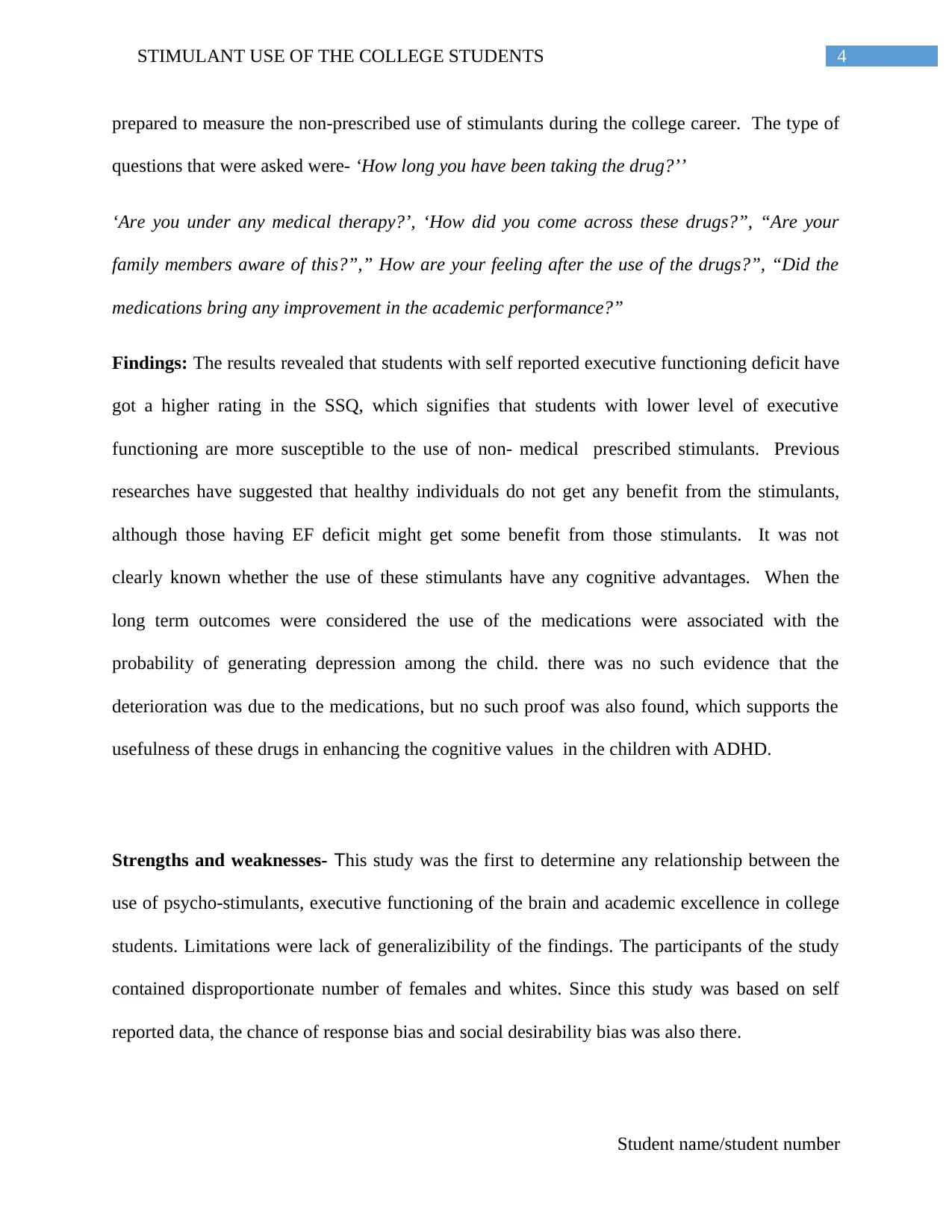
4STIMULANT USE OF THE COLLEGE STUDENTS
prepared to measure the non-prescribed use of stimulants during the college career. The type of
questions that were asked were- ‘How long you have been taking the drug?’’
‘Are you under any medical therapy?’, ‘How did you come across these drugs?”, “Are your
family members aware of this?”,” How are your feeling after the use of the drugs?”, “Did the
medications bring any improvement in the academic performance?”
Findings: The results revealed that students with self reported executive functioning deficit have
got a higher rating in the SSQ, which signifies that students with lower level of executive
functioning are more susceptible to the use of non- medical prescribed stimulants. Previous
researches have suggested that healthy individuals do not get any benefit from the stimulants,
although those having EF deficit might get some benefit from those stimulants. It was not
clearly known whether the use of these stimulants have any cognitive advantages. When the
long term outcomes were considered the use of the medications were associated with the
probability of generating depression among the child. there was no such evidence that the
deterioration was due to the medications, but no such proof was also found, which supports the
usefulness of these drugs in enhancing the cognitive values in the children with ADHD.
Strengths and weaknesses- This study was the first to determine any relationship between the
use of psycho-stimulants, executive functioning of the brain and academic excellence in college
students. Limitations were lack of generalizibility of the findings. The participants of the study
contained disproportionate number of females and whites. Since this study was based on self
reported data, the chance of response bias and social desirability bias was also there.
Student name/student number
prepared to measure the non-prescribed use of stimulants during the college career. The type of
questions that were asked were- ‘How long you have been taking the drug?’’
‘Are you under any medical therapy?’, ‘How did you come across these drugs?”, “Are your
family members aware of this?”,” How are your feeling after the use of the drugs?”, “Did the
medications bring any improvement in the academic performance?”
Findings: The results revealed that students with self reported executive functioning deficit have
got a higher rating in the SSQ, which signifies that students with lower level of executive
functioning are more susceptible to the use of non- medical prescribed stimulants. Previous
researches have suggested that healthy individuals do not get any benefit from the stimulants,
although those having EF deficit might get some benefit from those stimulants. It was not
clearly known whether the use of these stimulants have any cognitive advantages. When the
long term outcomes were considered the use of the medications were associated with the
probability of generating depression among the child. there was no such evidence that the
deterioration was due to the medications, but no such proof was also found, which supports the
usefulness of these drugs in enhancing the cognitive values in the children with ADHD.
Strengths and weaknesses- This study was the first to determine any relationship between the
use of psycho-stimulants, executive functioning of the brain and academic excellence in college
students. Limitations were lack of generalizibility of the findings. The participants of the study
contained disproportionate number of females and whites. Since this study was based on self
reported data, the chance of response bias and social desirability bias was also there.
Student name/student number
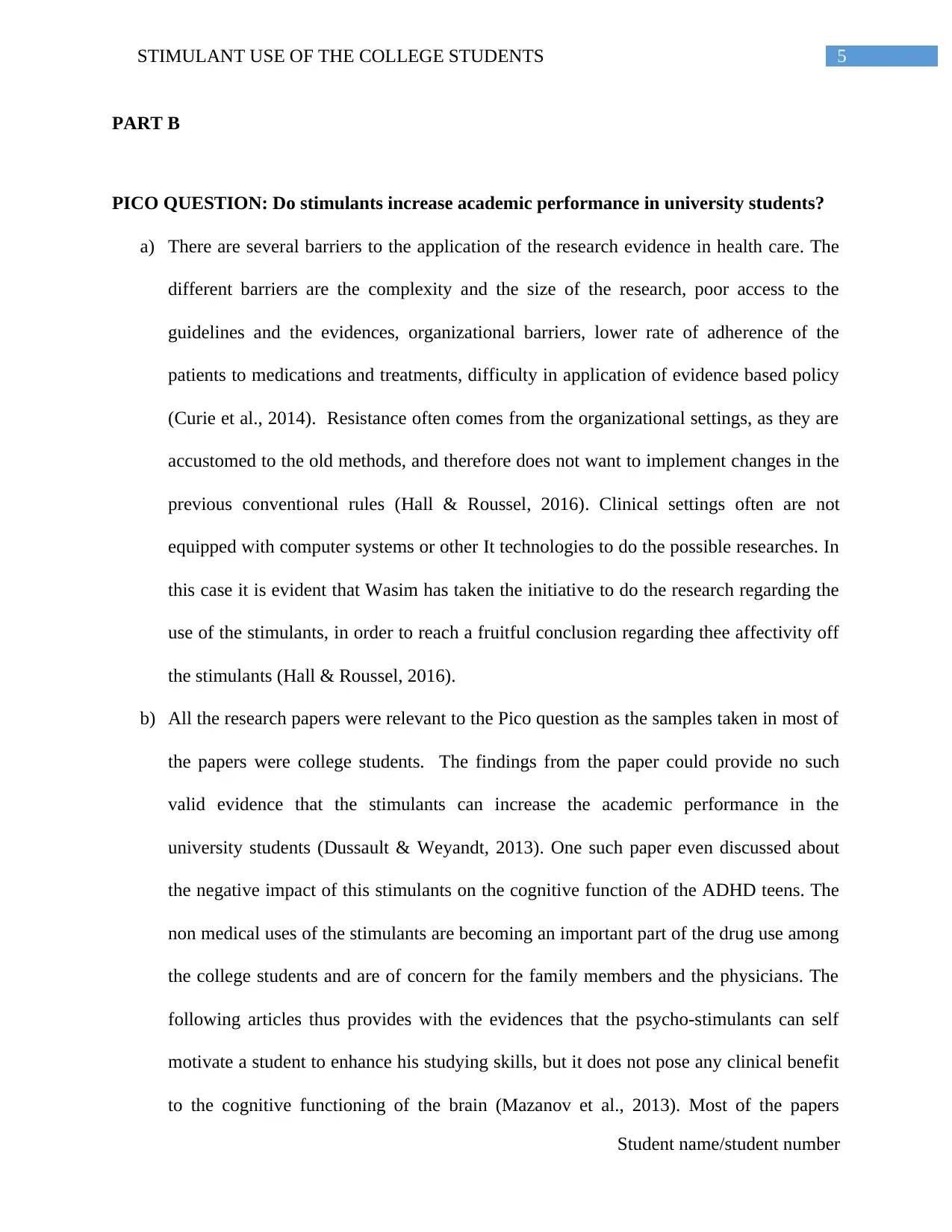
5STIMULANT USE OF THE COLLEGE STUDENTS
PART B
PICO QUESTION: Do stimulants increase academic performance in university students?
a) There are several barriers to the application of the research evidence in health care. The
different barriers are the complexity and the size of the research, poor access to the
guidelines and the evidences, organizational barriers, lower rate of adherence of the
patients to medications and treatments, difficulty in application of evidence based policy
(Curie et al., 2014). Resistance often comes from the organizational settings, as they are
accustomed to the old methods, and therefore does not want to implement changes in the
previous conventional rules (Hall & Roussel, 2016). Clinical settings often are not
equipped with computer systems or other It technologies to do the possible researches. In
this case it is evident that Wasim has taken the initiative to do the research regarding the
use of the stimulants, in order to reach a fruitful conclusion regarding thee affectivity off
the stimulants (Hall & Roussel, 2016).
b) All the research papers were relevant to the Pico question as the samples taken in most of
the papers were college students. The findings from the paper could provide no such
valid evidence that the stimulants can increase the academic performance in the
university students (Dussault & Weyandt, 2013). One such paper even discussed about
the negative impact of this stimulants on the cognitive function of the ADHD teens. The
non medical uses of the stimulants are becoming an important part of the drug use among
the college students and are of concern for the family members and the physicians. The
following articles thus provides with the evidences that the psycho-stimulants can self
motivate a student to enhance his studying skills, but it does not pose any clinical benefit
to the cognitive functioning of the brain (Mazanov et al., 2013). Most of the papers
Student name/student number
PART B
PICO QUESTION: Do stimulants increase academic performance in university students?
a) There are several barriers to the application of the research evidence in health care. The
different barriers are the complexity and the size of the research, poor access to the
guidelines and the evidences, organizational barriers, lower rate of adherence of the
patients to medications and treatments, difficulty in application of evidence based policy
(Curie et al., 2014). Resistance often comes from the organizational settings, as they are
accustomed to the old methods, and therefore does not want to implement changes in the
previous conventional rules (Hall & Roussel, 2016). Clinical settings often are not
equipped with computer systems or other It technologies to do the possible researches. In
this case it is evident that Wasim has taken the initiative to do the research regarding the
use of the stimulants, in order to reach a fruitful conclusion regarding thee affectivity off
the stimulants (Hall & Roussel, 2016).
b) All the research papers were relevant to the Pico question as the samples taken in most of
the papers were college students. The findings from the paper could provide no such
valid evidence that the stimulants can increase the academic performance in the
university students (Dussault & Weyandt, 2013). One such paper even discussed about
the negative impact of this stimulants on the cognitive function of the ADHD teens. The
non medical uses of the stimulants are becoming an important part of the drug use among
the college students and are of concern for the family members and the physicians. The
following articles thus provides with the evidences that the psycho-stimulants can self
motivate a student to enhance his studying skills, but it does not pose any clinical benefit
to the cognitive functioning of the brain (Mazanov et al., 2013). Most of the papers
Student name/student number
⊘ This is a preview!⊘
Do you want full access?
Subscribe today to unlock all pages.

Trusted by 1+ million students worldwide
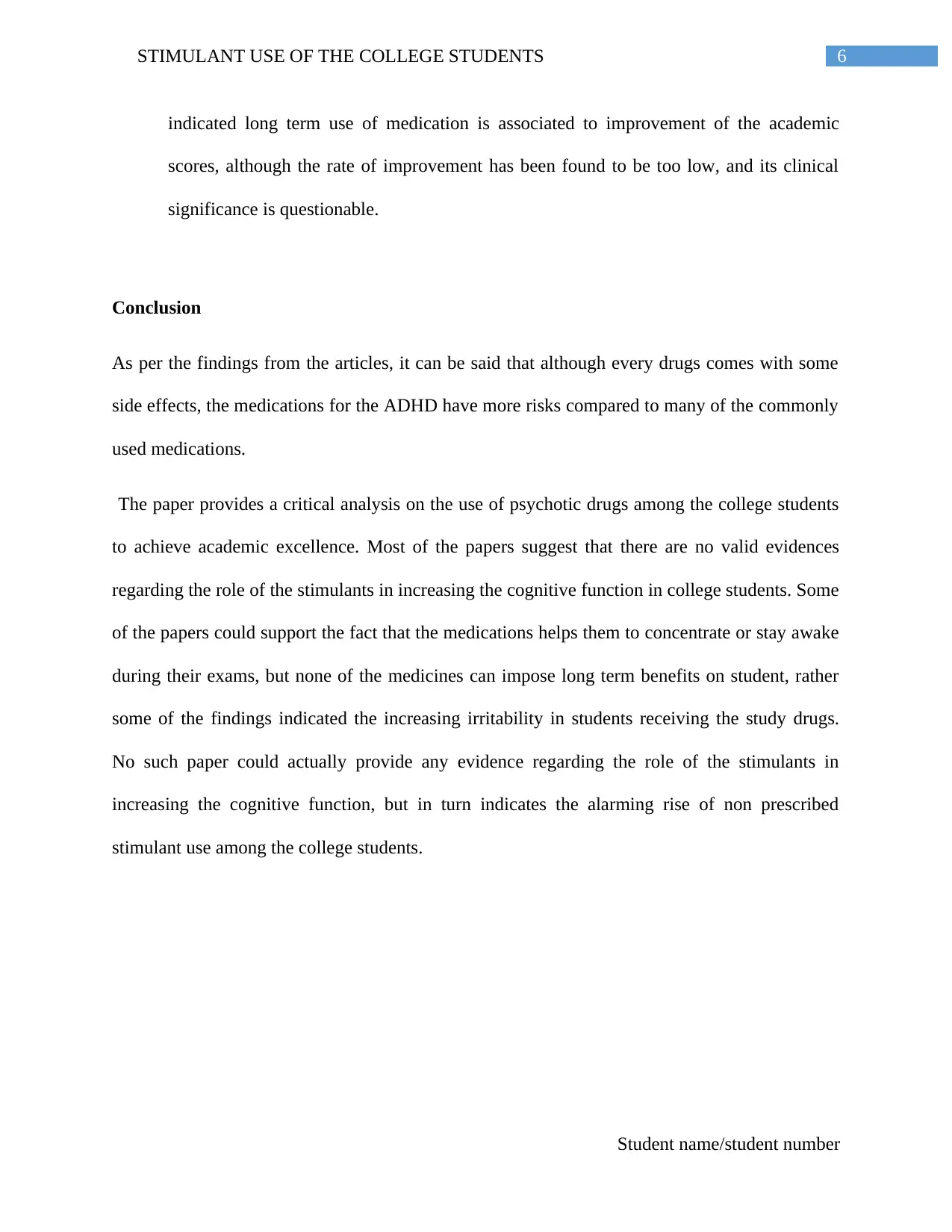
6STIMULANT USE OF THE COLLEGE STUDENTS
indicated long term use of medication is associated to improvement of the academic
scores, although the rate of improvement has been found to be too low, and its clinical
significance is questionable.
Conclusion
As per the findings from the articles, it can be said that although every drugs comes with some
side effects, the medications for the ADHD have more risks compared to many of the commonly
used medications.
The paper provides a critical analysis on the use of psychotic drugs among the college students
to achieve academic excellence. Most of the papers suggest that there are no valid evidences
regarding the role of the stimulants in increasing the cognitive function in college students. Some
of the papers could support the fact that the medications helps them to concentrate or stay awake
during their exams, but none of the medicines can impose long term benefits on student, rather
some of the findings indicated the increasing irritability in students receiving the study drugs.
No such paper could actually provide any evidence regarding the role of the stimulants in
increasing the cognitive function, but in turn indicates the alarming rise of non prescribed
stimulant use among the college students.
Student name/student number
indicated long term use of medication is associated to improvement of the academic
scores, although the rate of improvement has been found to be too low, and its clinical
significance is questionable.
Conclusion
As per the findings from the articles, it can be said that although every drugs comes with some
side effects, the medications for the ADHD have more risks compared to many of the commonly
used medications.
The paper provides a critical analysis on the use of psychotic drugs among the college students
to achieve academic excellence. Most of the papers suggest that there are no valid evidences
regarding the role of the stimulants in increasing the cognitive function in college students. Some
of the papers could support the fact that the medications helps them to concentrate or stay awake
during their exams, but none of the medicines can impose long term benefits on student, rather
some of the findings indicated the increasing irritability in students receiving the study drugs.
No such paper could actually provide any evidence regarding the role of the stimulants in
increasing the cognitive function, but in turn indicates the alarming rise of non prescribed
stimulant use among the college students.
Student name/student number
Paraphrase This Document
Need a fresh take? Get an instant paraphrase of this document with our AI Paraphraser
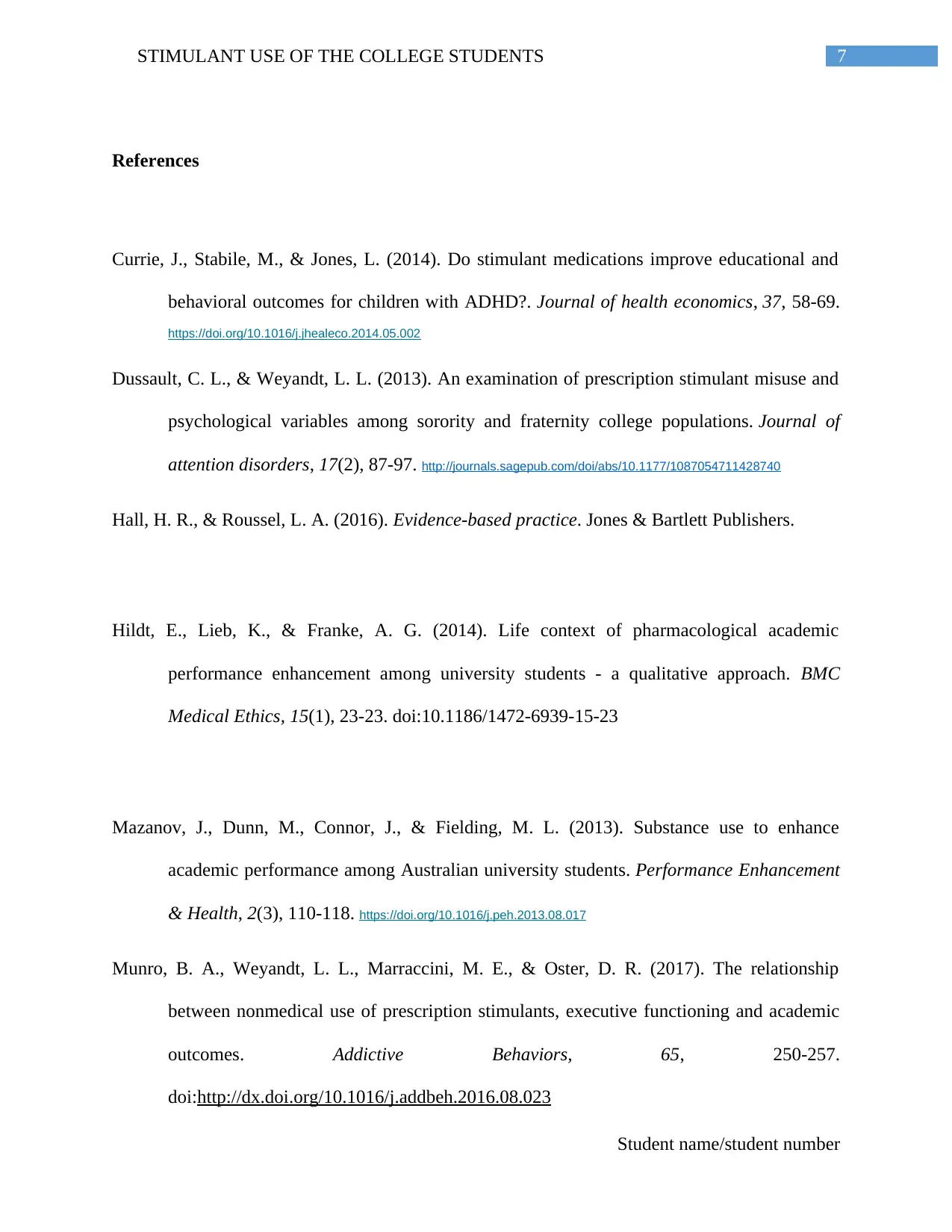
7STIMULANT USE OF THE COLLEGE STUDENTS
References
Currie, J., Stabile, M., & Jones, L. (2014). Do stimulant medications improve educational and
behavioral outcomes for children with ADHD?. Journal of health economics, 37, 58-69.
https://doi.org/10.1016/j.jhealeco.2014.05.002
Dussault, C. L., & Weyandt, L. L. (2013). An examination of prescription stimulant misuse and
psychological variables among sorority and fraternity college populations. Journal of
attention disorders, 17(2), 87-97. http://journals.sagepub.com/doi/abs/10.1177/1087054711428740
Hall, H. R., & Roussel, L. A. (2016). Evidence-based practice. Jones & Bartlett Publishers.
Hildt, E., Lieb, K., & Franke, A. G. (2014). Life context of pharmacological academic
performance enhancement among university students - a qualitative approach. BMC
Medical Ethics, 15(1), 23-23. doi:10.1186/1472-6939-15-23
Mazanov, J., Dunn, M., Connor, J., & Fielding, M. L. (2013). Substance use to enhance
academic performance among Australian university students. Performance Enhancement
& Health, 2(3), 110-118. https://doi.org/10.1016/j.peh.2013.08.017
Munro, B. A., Weyandt, L. L., Marraccini, M. E., & Oster, D. R. (2017). The relationship
between nonmedical use of prescription stimulants, executive functioning and academic
outcomes. Addictive Behaviors, 65, 250-257.
doi:http://dx.doi.org/10.1016/j.addbeh.2016.08.023
Student name/student number
References
Currie, J., Stabile, M., & Jones, L. (2014). Do stimulant medications improve educational and
behavioral outcomes for children with ADHD?. Journal of health economics, 37, 58-69.
https://doi.org/10.1016/j.jhealeco.2014.05.002
Dussault, C. L., & Weyandt, L. L. (2013). An examination of prescription stimulant misuse and
psychological variables among sorority and fraternity college populations. Journal of
attention disorders, 17(2), 87-97. http://journals.sagepub.com/doi/abs/10.1177/1087054711428740
Hall, H. R., & Roussel, L. A. (2016). Evidence-based practice. Jones & Bartlett Publishers.
Hildt, E., Lieb, K., & Franke, A. G. (2014). Life context of pharmacological academic
performance enhancement among university students - a qualitative approach. BMC
Medical Ethics, 15(1), 23-23. doi:10.1186/1472-6939-15-23
Mazanov, J., Dunn, M., Connor, J., & Fielding, M. L. (2013). Substance use to enhance
academic performance among Australian university students. Performance Enhancement
& Health, 2(3), 110-118. https://doi.org/10.1016/j.peh.2013.08.017
Munro, B. A., Weyandt, L. L., Marraccini, M. E., & Oster, D. R. (2017). The relationship
between nonmedical use of prescription stimulants, executive functioning and academic
outcomes. Addictive Behaviors, 65, 250-257.
doi:http://dx.doi.org/10.1016/j.addbeh.2016.08.023
Student name/student number
1 out of 8
Related Documents
Your All-in-One AI-Powered Toolkit for Academic Success.
+13062052269
info@desklib.com
Available 24*7 on WhatsApp / Email
![[object Object]](/_next/static/media/star-bottom.7253800d.svg)
Unlock your academic potential
Copyright © 2020–2026 A2Z Services. All Rights Reserved. Developed and managed by ZUCOL.





